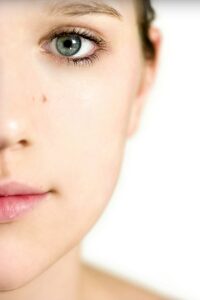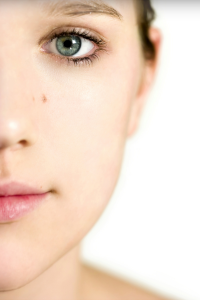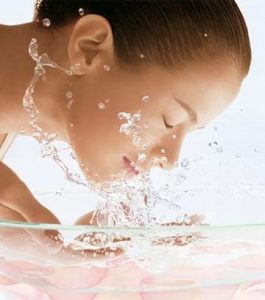It is really important for you to be able to identify your skin type. This is to enable you to look after your skin correctly. Also the selection of your cosmetics is, to a considerable extent, influenced by your skin type. Although no two skins are exactly similar most have characteristics which enable them to be grouped into one of the following types: Dry skin, Normal skin, Combination skin and Oily skin. To determine your skin type, wash your face with a mild face wash. Then, after 30 minutes, press a clean tissue against your forehead, nose, cheeks and chin. If the tissue shows no trace of oil, then you have dry skin. Dry skin looks rough and is prone to premature fine lines and wrinkles. If your skin is oily in some parts but dry in others, then you have combination skin. Normal skin usually looks smooth and is not prone to break outs. Oily skin feels oily to touch and tends to shine. Oily skin is also prone to blackheads and pimples. A sensitive skin needs special care, as it may be sensitive to some ingredients found in popular cosmetics. Those with sensitive skin should always use beauty aids that are hypoallergenic to protect their skin from allergic reactions.
A regular skin care programmed, adapted to the needs of your particular skin type, and goes a long way in keeping your skin radiant and problem free.
Dry Skin: Dry skin needs extra care, as it is prone to fine lines and wrinkles. This is especially true during the winter months when it feels even drier and may feel too taut or may even flake. A few measures help alleviate dryness and keep your skin supple and, at the same time, guard against premature aging.
1 Always wash your face with a mild, soap-free face wash. Never use soap, as that would further strip your skin of natural oil.
2. Always use a moisturizer during the day. Use upward, circular motion to lightly massage the moisturizer into your face. Make sure not to pull or tug your skin. 3.Many people suffer from weather-related dry skin. If the weather in the winter months is normally drier and this tends to dehydrate your skin, regular use of moisturizer will keep your skin hydrated and supple
Normal Skin Normal skin is usually trouble-free and needs simple care to keep it healthy and glowing. Normal skin also tolerates most popular lotions and creams as well. A regular skin-care program combined with a balanced, healthy diet helps keep normal skin stay supple and young. Regular care for normal skin should include a few simple steps.
1. Cleansing, toning, and moisturizing daily keeps normal skin in great shape for a long time. It is advisable to use natural products on your skin.
2. Creams and lotions that contain vitamin A, C and E help improve the texture of your skin, making it smoother and softer. Moreover, these vitamins counter the effects of free radicals. 3. Even if your skin is normal, you still have to give it regular care. Your skin, like any other skin type, is constantly assaulted by free radicals. Free radicals are molecules formed in the skin when it is exposed to the environment, pollution, or sunlight.
Combination Skin: Skin that is oily in some parts but dry or normal in others is considered as combination skin. The oily skin is concentrated on the T-zone, which is across the forehead, down the nose and chin. Whenever you wash your face, you may find that some areas of your face feel tight after washing; and that these parts look dull or feel dry and rough whereas the T-zone looks shiny, feels oily to touch and is prone to pimples and blackheads. Combination skin needs special attention because the dry parts of your face need to be considered, whereas the oily parts need to be kept clean to avoid breakouts. Follow these simple tips each day and see what a difference they make to your skin.
1. Cleanse your entire face twice a day. Always use a mild cleanser to gently remove dirt, grime and make-up from your face.
2. The dry areas of your face need to be moisturized to prevent the formation of premature wrinkles. Use a good moisturizer on the dry parts of your face, and if possible, use an oil-free moisturizer on your T-zone.
3. If you use make-up, try and use oil-free/shine control type of make-up on the T-zone. These products are easily available in the market today and help absorb all the excess oil secretion and control the shine.
Acne
Acne is the most common of all skin disorders. Almost everyone will have acne, most get mild cases, some moderate and a few are severe. Teens aren’t the only ones who get it. Acne has been diagnosed in young infants as well as in the elderly, but it is most often seen in teens and young adults with 85-100% of adolescents and up to 10% of young adults getting it.
Acne seems to affect the sexes somewhat differently. Before children reach puberty, acne is more commonly seen in girls. During puberty, acne affects boys and girls almost equally, but boys generally have more severe cases and in adulthood, it tends to be seen more often in women.
Acne is an infection on your skin. Normally, it happens because bacteria get into your pores where it breeds.
Once the skin becomes irritated by this, it will then react in the form of sores. This is the acne that you see on your face.
Acne is generally caused by the occurrence of the bacteria on your face and increased amounts of oils on the face which make it a welcoming place for bacteria to go and hide.
These two things are generally the case for most types of acne. But, there are different things that cause them to happen. This is what you need to learn in order to know how to treat your bacteria.
• The oils that are being secreted at high levels may be due to hormone imbalances that are caused by such things as puberty, stress, health issues and other conditions.
• Bacteria can get onto the face from a poor level of keeping your face and your skin properly cleaned.
• Bacteria can feed on the dead skin cells that are not properly exfoliated away, making this a more likely target for growth.
• Eating a poor diet can help to encourage oily skins as well as lowers the body’s ability to fight off the infections that it is facing.
Hormonal Treatment of Acne
Acne is thought to be initiated by the effect of masculinising hormones called “androgens” on oil glands that, during puberty, enlarge and become increasingly sensitive. This results in excessive oil secretion and blockage of pores, which leads to the initial non-inflamed spots of acne (whiteheads and blackheads). As the acne bacteria (Propionibacterium acnes) proliferate, the oil-rich environment in the pores leads to inflammation which becomes visibly apparent as red pimples, pustules and lumps.
How Your Emotions Influence Your Skin
Consider the experience of feeling embarrassed in front of others and instantly feeling your skin turn warm and red. Blushing is one of many examples of the ongoing powerful connection that exists between your emotions and your skin.
Your emotions exert ongoing control over the tone of your autonomic nervous system, which in turn, exerts ongoing control over your skin’s blood supply. As mentioned in part one of this series, the quality of blood supply that your skin receives is a chief determinant of its ability to be nourished and cleansed from the inside out.
Because of the ongoing influence that your emotions have over the health of your skin, it’s quite possible to have a skin condition worsen or enter a chronic state due to feeling anxious about the skin condition. For example, developing acne on your face may cause you to feel self conscious about your appearance, which activates your body’s stress response system via your nervous, endocrine, and cardiovascular systems; this will likely cause the acne to heal more slowly and maybe even result in new acne formation. This cycle can repeat itself many times over if you don’t break the anxiety-stress response cycle.
How to Have Clear and Healthy Skin
Being the largest organ in your body, your skin plays a number of critical roles in keeping you healthy, the most important ones being:
- Physical barrier for protection – the most important function of your skin is to prevent harmful microorganisms from entering your blood. Your skin accomplishes this through three main features:
- The way in which its cells are tightly organized.
- Regular production of sebum.
- The presence of large colonies of friendly bacteria that produce a number of substances that destroy unfriendly organisms – this is why using anti-bacterial soap is a bad idea.
- Regulator of body fluids and temperature – your skin helps to regulate body fluid balance, pH balance, and your core temperature by manipulating its blood supply and sweat production.
- Channel for elimination of waste products – through your sweat glands, your skin eliminates waste materials like urea, toxic metals, and excess lactic acid that is created by overworked muscles.
- Physical protection and detection of dangerous stimuli – your skin provides a layer of cushion for the rest of your body, protecting it against injury. Your skin also allows you to sense danger (hot temperatures, sharp objects, too much pressure, etc.) through sensory receptors that are located throughout your body – mainly in your hands, feet, and lips.



